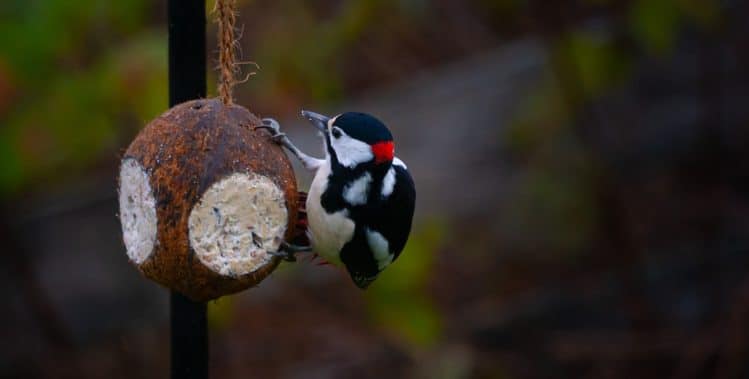There’s nothing more enjoyable than relaxing watching birds in your garden on the bird feeder – it really is one of life’s great joys. All three of my kids love it, and my wife too.
It’s fascinating to see who’ll turn up for a feast next, which is why choosing the types of food you leave out is so important. Coconut oil suet cakes are some of the most popular for the feathered friends that visit our backyard.
Wild birds can have coconut oil in their diet, and it’s actually good for them. Coconut oil is a saturated fat, and as birds have fast metabolisms they need lots of calories, so foods such as coconut oil suet cakes are beneficial for them, especially in colder weather.
Let’s discover more about giving coconut oil to the birds in your garden – and we’ll share a great recipe for those coconut oil suet cakes we mentioned too. 🙂

Will Coconut Oil or Coconut Water Harm Backyard Birds?
Coconut oil and coconut water will not harm backyard birds. In fact, it’s pretty good for them.
First, let’s talk about coconut oil. We humans should avoid too many saturated fats, but not birds. Small birds have pretty amazing metabolic rates. They need lots of calories and saturated fats are excellent for that.
Birds love suet, and they need it, particularly in the winter. When the nights are freezing cold and long, small birds need a little heat-producing energy help. Suet is an excellent source of nutrition and energy.
Most traditional suet starts with lard or animal fat as a base. Bird seeds, worms, peanut butter, fruits, nuts, and grains are added into the lard base, then formed into square cakes, balls, nuggets, shavings and plugs. Animal fat-based suet squares are widely available in hardware stores, online, garden stores and wild bird stores.
Insect-loving birds like Chickadees, Juncos, Nuthatches, Wrens, Hairy Woodpeckers, Flickers, Finches, Bullfinches, Robins, Bluebirds, Blue Jays, Steller’s Jays, Tanagers, Magpies and Grosbeaks all flock to suet feeders in the winter.
In the spring, some birds will nibble at a suet feeder because their migration pattern is out of step with insect emergence. They need energy and their favorite insect isn’t available.
For some bird-lovers, lard and animal fat aren’t a good choice for personal reasons. And, according to wild bird experts, margarine and vegetable oils aren’t a good choice either. They aren’t high enough in saturated fats.
You can use coconut oil instead, for a plant-based suet. Coconut oil is high in saturated fats (good for birds) and lower than lard for unsaturated fats.
In addition to the fat content, some experts say that an added benefit of coconut oil and coconut meat is that they can boost a bird’s immune systems. Coconut oil has natural antiviral and antibacterial properties. It also has essential magnesium, iron, selenium and other nutrients.
What about coconut water? Can you give coconut water to wild birds? Experts say yes, you can give coconut water to birds. But coconut water is often called coconut “milk” and experts say birds shouldn’t have milk. What gives?
Coconuts ripen from green to brown. When the coconut is still green, the fluid inside is clear. When the coconut ripens and becomes brown, the fluid inside gets “milky”. But it’s not really milk.
Another plant-based suet base to try is peanut butter. Or try peanut butter and coconut oil together!
Just don’t feed birds flaked coconut. The problem is that coconut flakes are desiccated. When birds have them in their stomachs, then drink water, the coconut flakes expand.
For more information on wild birds and coconuts, click here.
Can You Use Coconut Oil To Make Bird Feeders? (Instead of Suet)
You can use coconut oil as a suet base instead of animal-fat based lard. Some dedicated bird-lovers think birds prefer it.
Animal fat drippings are the traditional base for bird suet, but many bird lovers favor a plant-based alternative. Not only does coconut oil-based suet have lots of fat and nutrients, you can be sure you are avoiding the salts and preservatives you may get with animal-fat suet.
If you are going to try making coconut oil suet at home, try to find 100% organic, free-trade, cold-pressed coconut oil. Cold pressing is a term used today to indicate that the oil has been pressed out by a machine but kept at a low temperature to preserve its nutritive value.
Coconut oil is good for birds, but it melts easily. Coconut oil suet cakes work great in the winter – below 45°F. Try to keep coconut suet cakes out of the direct sun by hanging them from a tree. The north side of your house will be cooler.
To avoid birds striking the windows of your house, place the suet either closer than 3 feet or further than 25 feet away. Be sure to check on your suet daily as coconut oil can get soft and rancid quickly with warm temperatures. Experts say that coconut suet cakes might only last a day in summer but up to 5 days in the winter.
Coconut oil tends to melt easily, so wash the suet baskets often. Coconut oil suet cakes can be stored in the freezer for several months.
If you have bought some coconuts, try using the shell as a feeder or making a suet cake inside it. You can drill a couple of holes at the top to thread some twine to hang it with.
Birds will enjoy the coconut meat. Just poke holes through the “eyes” of the nut with a Phillips head screwdriver, pour off the coconut milk (enjoy it for cooking or drinking), then whack the nut with a hammer until it breaks. Once it’s open, rinse out any leftover coconut milk.
Here’s a video on how to crack a coconut.
How To Make Coconut Oil Suet Cakes For Backyard Birds
The recommended ratio of suet or lard to dry ingredients is one-third fat to two-thirds dry ingredients. Consider making smaller than usual coconut oil suet cakes so they stay fresh.
Use 100% organic, food-grade ingredients – birds are particularly susceptible to pesticides. If possible, buy fair trade coconuts. Try to find “cold-pressed” coconut oil.
Here’s a recipe for a vegan suet cake.
- 2/3 cup coconut oil, preferably unrefined.
- 2/3 cup unsalted black oil sunflower seeds.
- 3 tablespoons unsalted peanut butter, the chunkier the better.
- 3 tablespoons raw coarse cornmeal (polenta).
Gently warm the coconut oil over low heat in a saucepan, just until it starts melting. Mix in the other ingredients, then pour into a freezer-safe mold. Freeze to set and store in the freezer.
In addition to the ingredients above you can add raw old-fashioned oats, muesli, cooked rice, wild bird seed, mild grated cheese, dried unsweetened cranberries, cooked crushed eggshells, pumpkin seeds, mealworms, unsalted almonds, organic chopped apples, soaked raisins, shelled unsalted peanuts and walnuts.
Here are recipes for more homemade suet.

Can Garden Birds Eat Coconut Rice?
Yes. Just skip the salt. Cooked brown and white rice, in small quantities, are good for birds. If you cook it in coconut milk, even better.
By the way, we should all nix the urban myth about birds and raw rice. Many weddings have foregone the traditional rice-throwing as a result of this 30-year-old myth.
The origin of the myth was a state representative in 1985. The representative sponsored a bill that would impose a fine for rice-throwing. Apparently, the representative was inspired by a minister that reported dead birds outside their church after a rice-throwing wedding.
Turns out, many birds eat raw rice. They need to feed on raw rice in fields while migrating.
Can You Buy Coconut Oil Based Bird Foods?
We looked online for coconut oil-based suet. We found lots of adorable half coconut shells filled with suet, but the suet was made with rendered beef. If you are looking online, zoom into the packaging and check the ingredients.
We also called a wild bird seed store. They didn’t sell any coconut oil-based suet but thought it would be a great side gig to start. Our best advice is to call your local garden stores or wild bird feed stores.
Final Thoughts
In summary, yes – wild birds can have coconut oil in their diet – and it’s actually very good for them.
We love seeing wild birds on our bird table, we get all sorts including Mr Woodpecker, who the kids absolutely adore.
Our feathered friends love all the food we leave on the feeder, but those coconut oil suet cakes we put out for them do seem to be the most popular. 🙂



